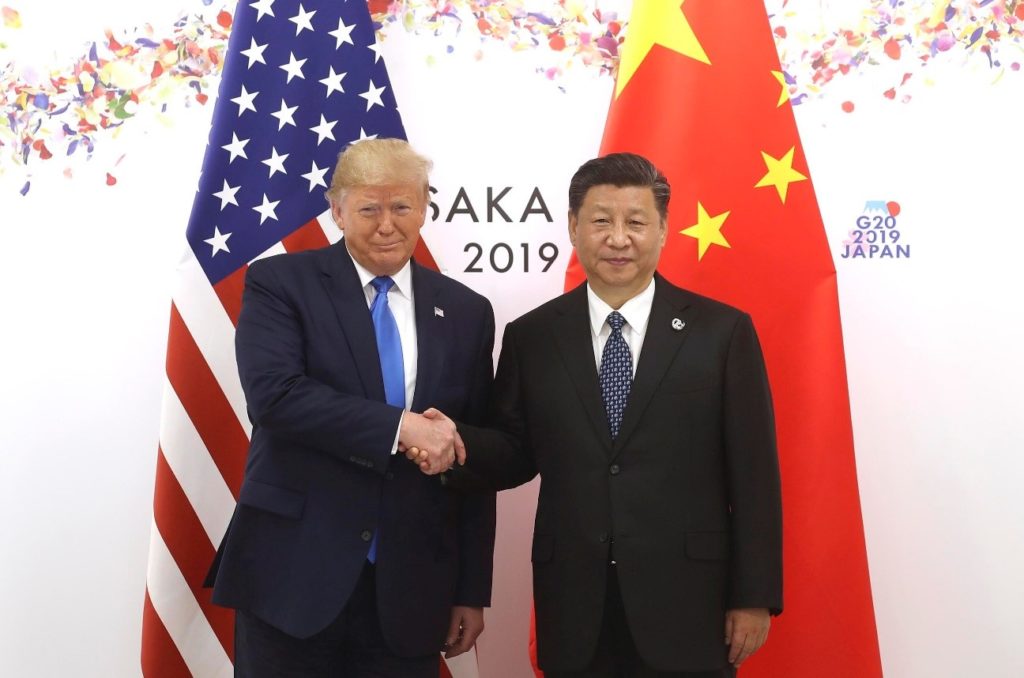“The Chinese government has been methodical in the way it’s analyzed our system… it’s assessed our vulnerabilities and it’s decided to exploit our freedoms, to gain an advantage over us at the federal level, the state level and the local level. . . Competition with China is happening. It’s happening in your state. In fact, I’d be surprised if most of you in the audience had not been lobbied by the Chinese Communist Party directly.” ~ Secretary of State Mike Pompeo
For more information on Secretary Pompeo’s address to the National Governors Winter Meeting, click here, here and here. From my perspective, his most important points from these reports are:
- We can’t ignore actions and strategic intentions.
- Groups loyal to communist China are operating out in the open in Virginia, Minnesota, Florida and dozens of other states. Other groups practice their nefarious actions in the shadows in an attempt to exercise influence over U.S. citizens and lawmakers.
- Chinese officials based in the U.S. actively seek to sow seeds of chaos at the state and local level—specifically in the realm of education on college campuses and K-12 classrooms.
- China campaigns to recruit U.S. scientists and academics to share vital secrets in exchange for monetary gain through their “Thousand Talents Plan,” a campaign that has targeted scientists and professors on campuses such as Virginia Tech and Harvard and triggered investigations by the Department of Justice.
- Beijing also pressures Chinese students to keep an eye on their fellow countrymen and report back about their activities.
- Chinese Party officials are cultivating relationships with county school boards and local politicians—ofter through what is known as “Sister City Programs.”
Secretary Pompeo, who previously served as Director of Central Intelligence, warned the State Governors about doing business with China and said it is common to finance communism without realizing it. He then extended the hand of the federal government to the governors, and said the Trump administration is standing by, ready to help states with this growing problem:
“I hope you will all take on board what’s I’ve said today . . . don’t lose sight of the competition from China that is already present in your state. Let’s all rise to the occasion and protect our security, our economy, indeed all that we hold dear.”
And Secretary Pompeo is not alone in recently raising concerns about China.
Click here for Attorney General William Barr’s important keynote address at a February 6, 2020 conference on possible China initiatives, held at the Center for Strategic and International Studies (CSIS).
You might wonder why the Attorney General is addressing the threat from China. Well, as he points at the beginning of his address, his original career goal was to go into the CIA as a China specialist, and therefore he spent six years at Columbia getting a B.A., an M.A. focusing on Chinese studies. And he recalled a debate in one of his government classes in the early 1970s about whether Russia or China would pose the greatest long-term threat to the United States.
He recalled one of his classmates argued that China posed the greatest long-term challenge, noting that Russia wants to conquer the world—which we could deal with, but that China wanted to own the world—and countering it would be a more difficult task. He added that, in 1972, we hoped that integrating China into the international economic system would encourage the PRC to liberalize its economy and that a freer market and economic growth would gradually lead to greater political freedom for its citizens.
Bad assumption, since economic liberalization has only gone so far—the Communist Party remains in firm control of the economy via an architecture of state power whose principal features are central planning, state-owned enterprises, and government subsidies. As he noted:
“Politically, the PRC remains a dictatorship under which the Communist Party elite jealously guard their monopoly on power. Marxist-Leninism and Maoism linger on, primarily as justification for communist rule, which is authoritarian through and through. The Communist Party is willing to resort to harsh measures to repress any challenge to its one-party rule, whether it is suppressing religion, rounding up and reeducating Uighurs, resisting efforts at self-determination in Hong Kong, or using the great firewall to limit access to ideas and penalize their expression.
“For a brief time after the Cold War, we had indulged the illusion of – that democratic capitalism had triumphed and was now unchallenged by any competing ideology. That was a nice – that was nice while it lasted. But we are now in a new era of global tension and competition. And China has emerged as the United States’ top geopolitical adversary based on competing political and economic philosophies.”
Barr emphasized that centuries before communism, China regarded itself as the central kingdom, Zhongguo. And it wasn’t central to the region; it was central to the world. And China’s ambition today is not to be a regional power, but to be a global one. And for China, success is a zero-sum game. Then General Secretary Xi directed his Communist Party members to concentrate on building a socialism superior to capitalism.
Moreover, Xi claimed such efforts would require party members to concentrate their entire spirit, their entire life, for the socialist ideal. And the reward for this sacrifice would be the eventual demise of capitalism.
Secretary Barr then focused on the challenge of China’s drive for economic and technological supremacy—not merely in economic terms, or that our competition with China is, at bottom, merely an economic rivalry. He emphasized that, for China, purely economic success is not an end in itself. It is a means to a wider political and strategic set of objectives.
He next reviewed a bit of history, how China has always used its economic strength as a tool to achieve its political and strategic objectives. In 2015, the Chinese leadership launched its “Made in China 2025 plan,” a sustained, highly coordinated campaign to replace the United States as the dominant technological superpower. The dictatorship has mobilized all elements of Chinese society, all government, all corporations, all academia, and all of its industrious people, to execute seamlessly an ambitious plan to dominate the core technologies of the future.
“This drive is backed by industrial policy involving huge investments in key technologies, massive financing, and subsidies in the hundreds of billions of dollars. Unfortunately, it also involves industrial espionage and theft of technology and intellectual property, as well as forced technology transfers, predatory pricing, leveraging China’s foreign direct investment, and strong-arm sales tactics in target markets, including the use of corruption.
“Make no mistake about it, China’s current technological thrusts pose an unprecedented challenge to the United States. The stakes for our country couldn’t be higher. Since the 19th century, the United States has been the world’s leaders in innovation and technology. It has been America’s technological prowess that has made us prosperous and secure. Our standard of living, our expanding economic opportunities for our young people and for future generations, and our national security all depend on our continued technological leadership.
“In the past, prior administrations and many in the private sector have too often been willing to countenance China’s hardball tactics, and it has been this administration that has finally moved to confront and counteract China’s playbook. (Applause.)”
Secretary Barr’s impressive presentation then focused on: 1) How China jumpstarts its technology initiatives by stealing our technology, and 2) Why China’s current focus on dominating 5G technology is of central concern.
He emphasized that totalitarian countries can engage in central economic planning that appears to be an advantage, especially when mobilizing the kind of technological blitzkrieg that we see unfolding today. But central planning suppresses technological innovation. Breakthrough ideas arise in free societies like ours, which have long led the way in cutting-edge technological development.
China is trying to have it both ways by orchestrating a centrally planned campaign to dominate key technologies while stealing the benefits of our free society. Such theft of our technology is not a side show; it undergirds and propels China’s efforts. Barr quoted John Demers, his assistant attorney general for his National Security Division, who observed that “China wants the fruits of America’s brain power to harvest the seeds of its planned economic dominance.”
In 2018, the Justice department launched its China Initiative to confront China’s maligned behaviors and to protect U.S. technology. Investigations have repeatedly shown how the PRC is using intelligence services and tradecraft to target valuable scientific and technical information held by the private sector and the academy—covering a range of technologies, from those applicable to commercial airplane engines, to renewable energy, to new materials, to high-tech agriculture.
Since the announcement of “Made in China 2025,” the Justice Department has brought trade secrets theft cases in eight of the 10 technologies that China aspires to dominate—by employing a multi-prong approach, e.g. by engaging in cyber intrusions, co-opting private sector insiders through its intelligence services, and using non-traditional collectors such as graduate students participating in university research projects.
Defendants have posed as U.S. customers to avoid export controls and recruit U.S. employees or co-opt insiders to steal trade secrets. And at academic and other research institutions, China uses talent programs to encourage the theft of intellectual property. And finally, China complements its plainly illicit activities with facially legal but predatory behavior: the acquisition of U.S. companies and other investments in the United States.
I encourage you to read Secretary Barr’s complete presentation of this theft, linked above, and note that its annual cost to the U.S. economy could be as high as $600 billion. He concluded these comments by noting our ability to protect American technology ultimately depends on working in collaboration with industry and the academy.
Then he turned to the pivotal nature of 5G technology and China’s threat arising from its drive to dominate this field because 5G technology lies at the center of the emerging technological and industrial world.
As Barr emphasized, communications networks are no longer just for communications; they are evolving into the central nervous system of the next generation of internet, the industrial internet, and the next generation of industrial systems that will depend on that infrastructure.
“China has built up a lead in 5G, capturing 40 percent of the global infrastructure market, and for the first time in history, the United States is not leading the next technological era.”
Barr noted that the dangers of allowing China to establish dominance in 5G have led to the immediate security concern of China’s exploitation of our communications networks,
“a monumental danger, and for that reason alone we should mobilize to surmount China’s drive to dominate 5G. But the stakes are far higher than this. It has been estimated that the industrial internet powered by 5G could generate new economic opportunities in the range of 23 trillion (dollars) by 2025. If China establishes sole dominance over 5G, it will be able to dominate the opportunities arising from a stunning range of emerging technologies that will be dependent on and interwoven with the 5G platform.”
If the industrial internet becomes dependent on Chinese technology, China could cut countries from technology and equipment upon which their consumers and industry depend. The power the United States has today to use economic sanctions would pale by comparison to the unprecedented leverage we would be surrendering into the hands of China.
I urge my readers to review the entire speech by Attorney General Barr, who well understands these important issues, not only as a long time student of China but also as one who spent 15 years in the telecommunications business. He understands the technology and the threat—and he is well placed in heading the Department fo Justice to play a major role in countering the 5G threat that is dramatically more challenging than what was posed by the shift from 3G to 4G.
He explains how we are playing “catch-up” in achieving and exploiting multi-gigabyte-per-second peak rates for both download and upload-—which, coupled with placing Edge computing facilities closer to the users, means 5G is capable of extremely low latency, under 10 milliseconds. And with this capacity, the tiniest devices can have virtually instantaneous connectivity and access the infinite commuting—computing power.
With these characteristics, 5G becomes a real-time, precise system of command and control. Devices of all kinds can be dispersed and embedded in business and industrial equipment across a wide array of businesses, such as transportation, energy, finance, health care, agriculture, heavy construction, etc. 5G provides the command-and-control function for managing all of these industrial processes.
As the world of 5G unfolds, we will be seeing not just smart homes, smart thermostats, but smart farms, smart factories, smart heavy construction projects, smart transportation systems, and so forth, and a host of new emerging technologies. In addition to artificial intelligence, we’ll become interwoven with and dependent on 5G and the industrial internet; for example, robotics, the Internet of Things, autonomous vehicles, 3D printing, nanotechnology, biotechnology, material science, energy storage, and quantum computing.
We dare not permit China to continue its un-confronted 5G leadership role an infrastructure business that is so vital to our viability as a free nation. We must step up to confronting the Chinese who are using every lever of power to expand their 5G market share around the globe. It is estimated that the total market for 5G infrastructure is $76 billion.
China is offering over $100 billion in incentives to finance customer purchases of its equipment. That means that China can offer its customers to build their 5G networks for no money down. And they have a salesforce and technicians of 50,000 around the globe to push the acceptance of Huawei infrastructure.
Chinese companies start with the advantage of the largest domestic market, giving them instant scale. And as they add this around the world, they will be able to invest more in their technology. The more China gains ground as a supplier of 5G infrastructure, the more it will also gain ground in all the constituent technologies that undergird 5G infrastructure—including those that are vital to our national security interests. .
China now consumes over half of the world’s semiconductors, and has now started to replace U.S. semiconductors with its own. Its scale in this field will permit it to make the investments needed to close the current quality gap. As China builds its scale in the semiconductor industry, it will place substantial pressure on alternative semiconductor suppliers. And of course, semiconductors are indispensable to a wide range of technology and industries, apart from 5G.
This is the world that President Trump confronts in his efforts to negotiate with China. Economics is at the heart of this negotiation, of course. But our viability depends on our military capabilities as well, and they also are being challenged by China. A Trade Deal alone is not good enough to provide the strategy and defense modernization efforts we desperately need.
Click here for last week’s message that dealt with the world pertinent to our space-based military capabilities—and more importantly our lack of strategic vision for the U.S. Space Force in its infancy. We’re playing “catch-up” there, too.
Bottom Lines.
China poses an existential threat to U.S. National Security — in my view a much greater threat than Russia. And it’s long past time that we awoke to that threat, which has critically important economic and military components. We must counter both!
The Trump administration is seeking to change the course it inherited from decades of inadequate recognition of our growing peril—in both Democrat and Republican administrations.
We have been in this position before and Americans have come through when it was needed. And it is needed again—to confront the threat from China.
What can you do?
Join us in praying for our nation, and for a rebirth of the freedom sought, achieved and passed to us by those who came before us.
Help us to spread our message to the grass roots and to encourage all “powers that be” to provide for the common defense as they are sworn to do.
Begin by passing this message to your friends and suggest they visit our webpage www.highfrontier.org, for more information. Also, please encourage your sphere of influence to sign up for our weekly e-newsletter.
Encourage them to review our past email messages, posted on www.highfrontier.org, to learn about many details related to the existential manmade and natural EMP threats and how we can protect America against them. I hope you will help us with our urgently needed efforts, which I will be discussing in future messages.
Click here to make a tax deductible gift. If you prefer to mail a check, Please send it High Frontier, 20 F Street 7th Floor, Washington, DC 20001.
Please click here to read Past Weekly Updates!
Please help High Frontier continue this important and timely work!
Be sure to follow us on our Social Sites!
If you found this letter via our Social Sites, and you would like to subscribe, please click below!






